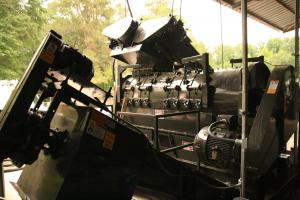With unique depackaging equipment installed, Green Energy Biofuel and ReSoil Compost offer customers more zero-landfill options to go green and save money.
WINNSBORO, SOUTH CAROLINA, USA, July 19, 2022 /EINPresswire.com/ -- Landfilling food waste should be the last resort, according to the U.S. EPA’s Food Recovery Hierarchy, after source reduction, feeding the hungry and other beneficial uses such as composting. Unfortunately, due to expirations, recalls, packaging materials and convenience, the first—and easiest—choice for large food companies and grocery-store chains in many instances is paying to dump this material.
South Carolina-based grease recycler Green Energy Biofuel and sister company ReSoil Compost are ready to break this cycle. They recently installed a new TurboSeparator-brand Depackaging Boss, model T42, equipped to handle wet or dry food waste in industrial-scale, bulk quantities.
“The market is desperate for what we have to offer,” says BioJoe Renwick, co-owner of Green Energy Biofuel and ReSoil Compost. “We’re the only company this side of Texas that owns this kind of equipment.”
Owning a composting facility is a prerequisite to cost-effectively operate one of these massive systems, according to Renwick. “Disposal costs for food waste are through the roof,” he says. “And if you’re landfilling this waste, are you really green? For oil-based condiments, if you can’t recover the oil, how green are you?”
U.S. food waste is estimated at between 30 and 40 percent of the food supply, based on USDA estimates of 31 percent food loss at the retail and consumer levels. This added up to approximately 133 billion pounds and $161 billion worth of food in 2010. These figures are likely much higher today.
Renwick says he knows firsthand of one large food company that landfills 300,000 pounds of one particular condiment every month. “What kind of business model is that?” he says with disbelief. And this is just the tip of the iceberg.
Food is the single largest category of material placed in municipal landfills, according to EPA, where it emits methane—a powerful greenhouse gas. Municipal solid waste landfills are the third-largest source of human-related methane emissions in the country, accounting for more than 14 percent of these emissions in 2017.
Many large food companies are not living up to their corporate responsibility to sustainability, Renwick says. America’s food banks receive approximately 3.6 billion pounds of food a year—just a fraction of the material that could have been donated but is landfilled instead, according to the U.S. government.
When foods near the end of their shelf life, many companies pull these items from display and send them to food banks for a tax write-off. While donating food to organizations that distribute it to the needy is admirable, when the products are so close to their expiration, Renwick says, “This leaves the burden on the food banks to get rid of the food in a week since they can’t legally distribute expired food.”
With the Depackaging Boss installed and ready for use, Green Energy Biofuel and ReSoil Compost plan to make food companies an offer they cannot refuse—providing them a rare opportunity to live up to their corporate responsibility to sustainability, shareholder demands for zero-landfill operations, and societal pressures to reduce, reuse and recycle.
The T42 model can depackage 10 to 30 tons per hour with its 56 “Gorilla Fists” powered by a 75-horsepower motor. The system can process industrial bulk and palleted prepackaged foods, grocery-store organics, mixed commercial source-separated organics, and even goods packaged in 5-gallon pails.
The days of large corporations landfilling untold tons of food waste every month are coming to an end—one way or another. “Addressing food loss and waste is key to a resilient, climate-smart food system,” said Agriculture Secretary Tom Vilsack.
Green Energy Biofuel and ReSoil Compost are ready to do their part by being a one-stop, 100 percent vertically integrated waste-service provider for even the largest food-waste generators. Green Energy Biofuel’s industrial-scale grease-recycling center in Aiken, South Carolina, can process railcars of oily waste and even has a wastewater permit secured this spring. In addition, the company operates three other grease-processing facilities in Winnsboro, South Carolina; Raleigh, North Carolina; and Knoxville, Tennessee. But changing food corporations’ longstanding culture of waste won’t happen overnight.
“You name the company, they’re landfilling everything,” Renwick says. “If they can throw it away and not get in trouble, they will. Now, we can offer them full organics-waste service”—even Class III compost material like raw meat. Regarding food companies’ wasteful ways, Renwick says, “I’m not sure when the craziness will stop. Some of these companies are just not willing to recycle—even when it makes complete financial sense. We can only hope they wake up soon and start caring.”
To find out how your food company can become a zero-landfill operation, contact Green Energy Biofuel and ReSoil Compost today.
BioJoe Renwick
Green Energy Biofuel
+1 803-718-6323
biojoe@gebiofuel.com
Visit us on social media:
Facebook
Twitter
LinkedIn



